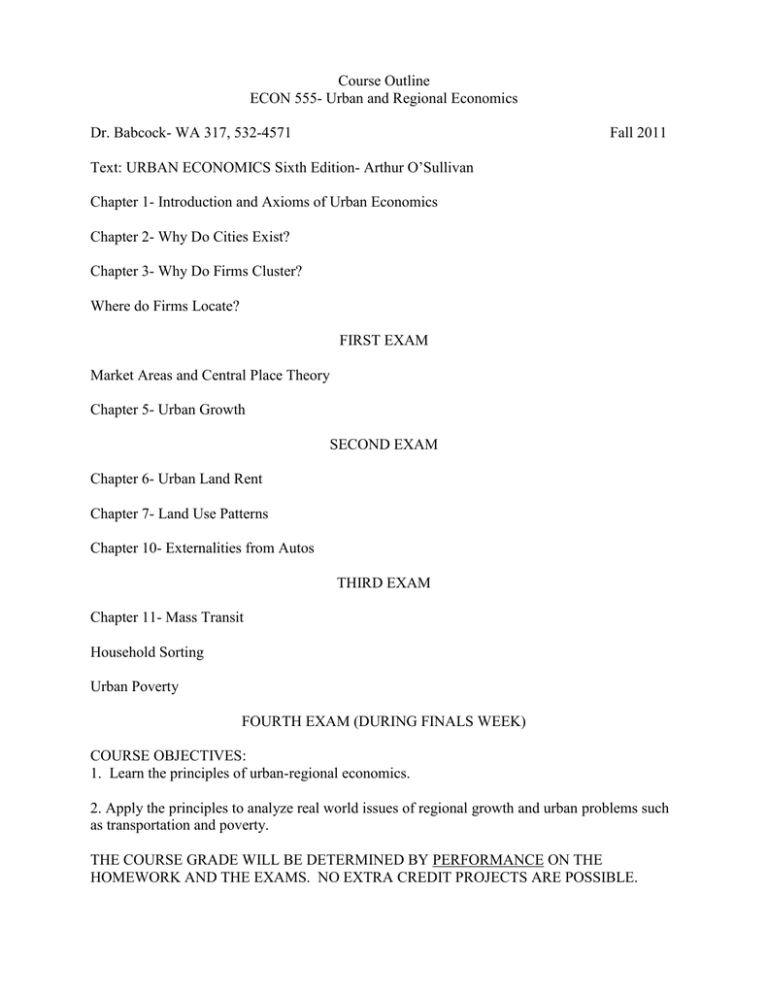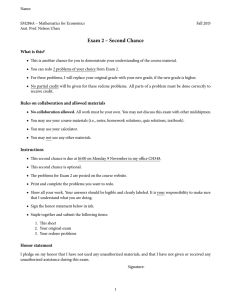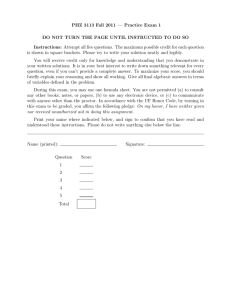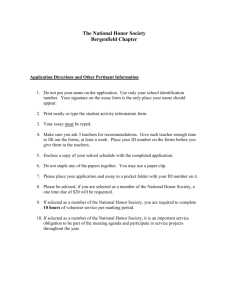Course Outline ECON 555- Urban and Regional Economics
advertisement

Course Outline ECON 555- Urban and Regional Economics Dr. Babcock- WA 317, 532-4571 Fall 2011 Text: URBAN ECONOMICS Sixth Edition- Arthur O’Sullivan Chapter 1- Introduction and Axioms of Urban Economics Chapter 2- Why Do Cities Exist? Chapter 3- Why Do Firms Cluster? Where do Firms Locate? FIRST EXAM Market Areas and Central Place Theory Chapter 5- Urban Growth SECOND EXAM Chapter 6- Urban Land Rent Chapter 7- Land Use Patterns Chapter 10- Externalities from Autos THIRD EXAM Chapter 11- Mass Transit Household Sorting Urban Poverty FOURTH EXAM (DURING FINALS WEEK) COURSE OBJECTIVES: 1. Learn the principles of urban-regional economics. 2. Apply the principles to analyze real world issues of regional growth and urban problems such as transportation and poverty. THE COURSE GRADE WILL BE DETERMINED BY PERFORMANCE ON THE HOMEWORK AND THE EXAMS. NO EXTRA CREDIT PROJECTS ARE POSSIBLE. Your grade in the course is determined as follows: Exams/Homework First Test Second Test Third Test Fourth Test Homework Points 100 100 100 100 100 Percent of Course Grade 20 20 20 20 20 To compute your homework score, divide the number of homework points you got correct by the total number of possible homework points. For example, suppose there are 200 possible homework points and a student gets 180 correct. This student’s homework score would be 180/200 = 90 percent. This would translate into 90 points for the homework grade. The course is to a certain extent, cumulative. Certain principles are used throughout the course. However, each exam specifically covers only the material following the preceding exam. Exams may be made up if the following conditions are met: 1. In my view the excuse is reasonable. 2. You notify me prior to the exam. IGNORANCE OF THE TIME AND DAY OF THE EXAM IS NOT A REASONABLE EXCUSE. IF THIS OCCURS YOU WILL NOT BE ALLOWED TO MAKE UP THE EXAM. Kansas State University has an Honor System based on personal integrity, which is presumed to be sufficient assurance that, in academic matters, one's work is performed honestly and without unauthorized assistance. Undergraduate and graduate students, by registration, acknowledge the jurisdiction of the Honor System. The policies and procedures of the Honor System apply to all full and part-time students enrolled in undergraduate and graduate courses on-campus, offcampus, and via distance learning. The honor system website can be reached via the following URL: www.ksu.edu/honor . A component vital to the Honor System is the inclusion of the Honor Pledge which applies to all assignments, examinations, or other course work undertaken by students. The Honor Pledge is implied, whether or not it is stated: "On my honor, as a student, I have neither given nor received unauthorized aid on this academic work." A grade of XF can result from a breach of academic honesty. The F indicates failure in the course; the X indicates the reason is an Honor Pledge violation. Any student with a disability who needs an accommodation or other assistance in this course should make an appointment to speak with me as soon as possible. All student activities in the University, including this course, are governed by the Student Judicial Conduct Code as outlined in the Student Governing Association By Laws, Article VI, Section 3, number 2. Students who engage in behavior that disrupts the learning environment may be asked to leave the class.




